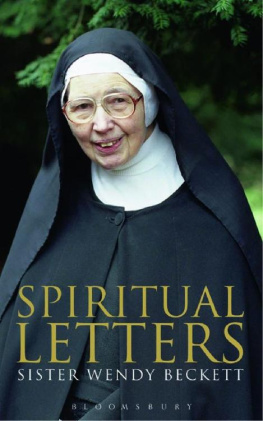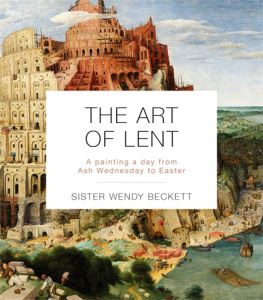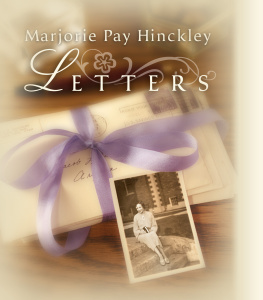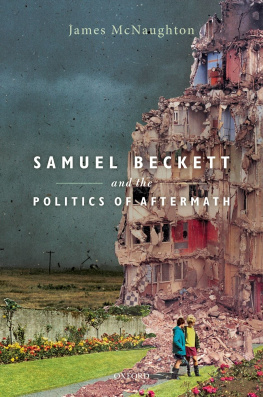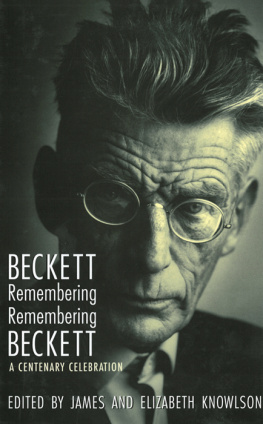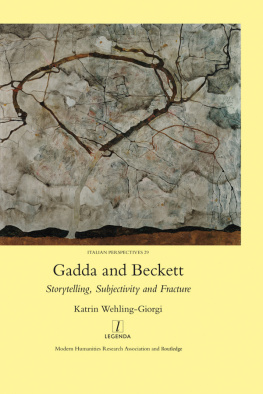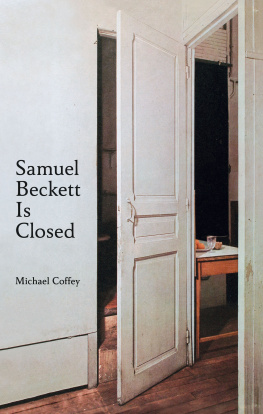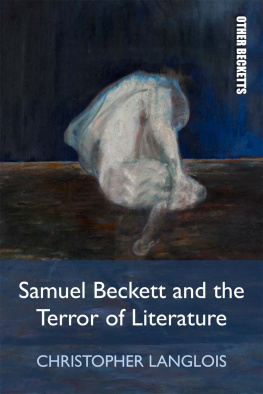SISTER WENDY BECKETT - SPIRITUAL LETTERS
Here you can read online SISTER WENDY BECKETT - SPIRITUAL LETTERS full text of the book (entire story) in english for free. Download pdf and epub, get meaning, cover and reviews about this ebook. City: Place of publication not identified, year: 2019, publisher: BLOOMSBURY CONTINUUM, genre: Religion. Description of the work, (preface) as well as reviews are available. Best literature library LitArk.com created for fans of good reading and offers a wide selection of genres:
Romance novel
Science fiction
Adventure
Detective
Science
History
Home and family
Prose
Art
Politics
Computer
Non-fiction
Religion
Business
Children
Humor
Choose a favorite category and find really read worthwhile books. Enjoy immersion in the world of imagination, feel the emotions of the characters or learn something new for yourself, make an fascinating discovery.
- Book:SPIRITUAL LETTERS
- Author:
- Publisher:BLOOMSBURY CONTINUUM
- Genre:
- Year:2019
- City:Place of publication not identified
- Rating:4 / 5
- Favourites:Add to favourites
- Your mark:
- 80
- 1
- 2
- 3
- 4
- 5
SPIRITUAL LETTERS: summary, description and annotation
We offer to read an annotation, description, summary or preface (depends on what the author of the book "SPIRITUAL LETTERS" wrote himself). If you haven't found the necessary information about the book — write in the comments, we will try to find it.
SPIRITUAL LETTERS — read online for free the complete book (whole text) full work
Below is the text of the book, divided by pages. System saving the place of the last page read, allows you to conveniently read the book "SPIRITUAL LETTERS" online for free, without having to search again every time where you left off. Put a bookmark, and you can go to the page where you finished reading at any time.
Font size:
Interval:
Bookmark:
SPIRITUAL LETTERS
SISTER WENDY BECKETT

First published in Great Britain 2013
Copyright Sister Wendy Beckett, 2013
The moral right of the author has been asserted
No part of this book may be used or reproduced in any manner whatsoever without written permission from the Publisher except in the case of brief quotations embodied in critical articles or reviews. Every reasonable effort has been made to trace copyright holders of material reproduced in this book, but if any have been inadvertently overlooked the Publishers would be glad to hear from them.
A Continuum book
Bloomsbury Publishing Plc
50 Bedford Square
London WC1B 3DP
www.bloomsbury.com
Bloomsbury Publishing, London, New Delhi, New York and Sydney
For reasons of confidentiality, the names of all the persons to whom these letters have been addressed, or who are mentioned in the text, have been altered.
A CIP record for this book is available from the British Library.
ISBN 9781408188415
10 9 8 7 6 5 4 3 2 1
Typeset by Fakenham Prepress Solutions, Fakenham, Norfolk NR21 8NN
CONTENTS
W e all know the Chinese curse: may you live in interesting times, and those who were born in 1930, as I was, have indeed known the affliction of living through times of terrible and sinister interest. Yet, I feel, though I have lived through these times I have somehow escaped the curse of them. This is not to my credit, because the tragedy of these years must have purified and ennobled those who were willing to accept suffering as the Cross of Christ. We all have a cross, the cross of who we are and where we are and when we are, and in carrying it with Jesus we are drawn into His redemption. Somehow these big and painful events passed me by. My life has been a very sheltered one, with hardly any events to provide much of a narrative.
In this unimpressive life of mine, I can distinguish only two significant choices. The first, which formed itself in early childhood, was to become a nun, and this I was able to do just before my seventeenth birthday. I wanted to become a nun, because that was the only way I could see to belong totally to God. I understand now, of course, that every way of life can be given to Him, and that a nun is no more potentially holy than a bus driver or a dentist. But subjectively, in personal terms, to become a nun was necessary for me. I have come to the conclusion, looking back, that a bus driver or dental Sister Wendy would have fallen pathetically by the roadside. I would not have been strong enough to accept the Spirit of Jesus drawing me to the Father, without the framework and support of the religious life. When I thought of becoming a nun, (which I imagined would solve all my difficulties), I thought essentially of having time to pray. It never occurred to me, idiotic child that I was, that I had asked to enter with the order where I was at school, the Sisters of Notre Dame de Namur. This is a splendid order of devoted apostolic women, heroically living by the spirit of St. Julie Billiart, dedicated to education, particularly of the poor. Such a life of happy sacrifice is not possible without a deep spirit of prayer, but part of the sacrifice is that the time for prayer has to be limited. The generosity of an SND makes that limited time fruitful throughout the day. I chose well, in that I entered a loving community of women, who would teach me the basics of religious life, so that I understood the vows of poverty, chastity and obedience. These vows set the nun free to live for God. I was too spiritually weak to live in this freedom without more time on my knees, and asked regularly if it would be possible to transfer to a contemplative order. I was told that my work with the students was needed, (and after all, the Order had paid for me to go to Oxford, a blessing for which I have always been grateful and which I felt obligated to make use of for our students). But, when one makes a vow of obedience, one cannot disregard it because one does not like what one is asked to do. The pain of submission is a way into the Passion of Jesus that all nuns find profoundly redemptive. Actually, nothing could have been better for me, monolith of selfishness that I was; the life of a teaching nun is deeply purifying. Finally, however, my health gave way when I was 40, and the Order itself, very generously, suggested that I should try the contemplative life.
This was the second and final change in my uneventful life: I came to live in solitude. A Carmelite Monastery agreed to let me live within their enclosure, and bought me a caravan which stands within a small copse of trees. The Bishop allowed me to take the vows of a Consecrated Virgin, living under the protection and guidance of the Carmelites. The prioress of the monastery is my Superior, my prioress, and the sisters care for me. I do not speak to them, except to the sister who is my official and beloved guardian. There is no blueprint for the kind of life that I am now privileged to lead. I had to make out my own horarium, which included seven hours of prayer, seven hours of sleep, two of work and so on. I had to decide on how to simplify all I did, so that my attention could dwell uninterruptedly on God. Hence the need of a religious habit, so as never to have to think of what I was to wear, and of daily simplicity of meals, so that I would not have to think of what I would eat. I did not want to waste time on these things, and the Community undertook, in their goodness, to provide me with cooked vegetables cold, and milk and whatever a healthy diet demanded. Because they have taken on this burden of love, I am able to devote myself to prayer, which is the greatest of privileges and the most demanding of responsibilities. I had read about people living a hermit or semi-hermit life, who spent prayerful hours gardening. I value this in theory, but in practice I am a sadly sedentary woman. For me gardening would be a penance that I would actually find distracting. The other activity of the solitary seems to be what is known as the apostolate of the letter. Again, I admire this and have read such letters with delight and instruction. The Spiritual Letters of Dom John Chapman OSB was one of my favourite books as a young nun. But it is not an apostolate to which I have ever felt drawn. When I came to live in solitude I made it clear I would not be writing letters, except out of duty. This meant a fortnightly letter to my mother, and the occasional letter of thanks to friends and benefactors. But one cannot limit duty to what one would like. There were people who had helped me when I was a teaching nun and there were sisters in the Carmelite monastery who occasionally asked my opinion, for what it was worth. I had no idea of how many of these helpful letters I had written, still less that the nuns to whom they were written, had saved them. It seems an impertinence to write a preface to letters that I have not re-read, but I simply cannot bring myself to do so. In fact, I do not think I have ever read them, because I scribbled them off (in my illegible hand), and sent them off without ever reading what I had written. It is difficult to imagine that there is anything worth preserving in them but, by not re-reading them, I am saving myself from the embarrassment of finding out how painfully true this is (is this shameful?, oh, perhaps but I cannot!).
Sister Gillian Leslie, the librarian to the monastery, has been kind enough to agree to edit whatever letters have been sent to her and to provide an introduction.
INTRODUCTION BY
SISTER GILLIAN
T his collection of notes and letters, brought to light for the first time here, reveals an aspect of Sister Wendy about which few who do not know the religious life from within could have much idea. The nun who faces the camera and talks so knowledgeably and wittily about works of art has become a familiar sight, and articles and interviews have detailed again and again the solitude and hours of prayer that support this spare and now visibly aged figure. But to read someone elses account, often polite but uncomprehending, is one thing; to overhear the voice of one who is speaking intimately out of the heart of the spiritual sources that sustain her is another. It is something like this to which these letters expose us and, in doing so, help us to understand what drives this life lived so uncompromisingly for God.
Next pageFont size:
Interval:
Bookmark:
Similar books «SPIRITUAL LETTERS»
Look at similar books to SPIRITUAL LETTERS. We have selected literature similar in name and meaning in the hope of providing readers with more options to find new, interesting, not yet read works.
Discussion, reviews of the book SPIRITUAL LETTERS and just readers' own opinions. Leave your comments, write what you think about the work, its meaning or the main characters. Specify what exactly you liked and what you didn't like, and why you think so.

